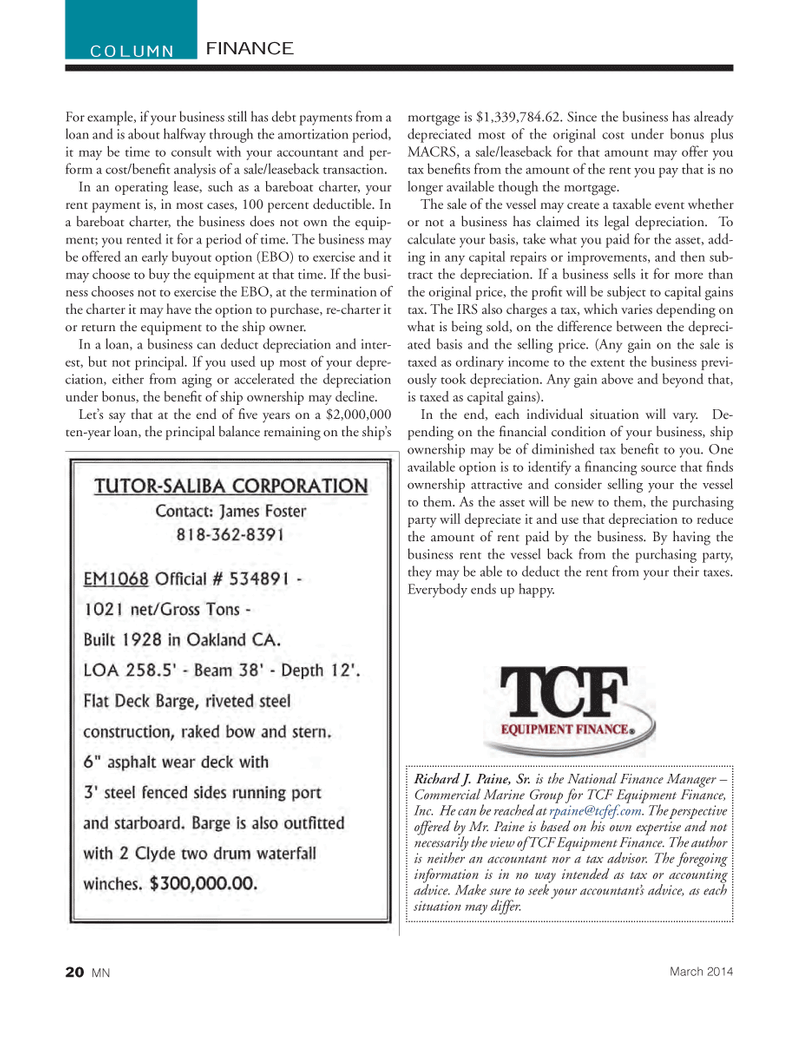
Page 20: of Marine News Magazine (March 2014)
Fleet & Vessel Optimization
Read this page in Pdf, Flash or Html5 edition of March 2014 Marine News Magazine
For example, if your business still has debt payments from a loan and is about halfway through the amortization period, it may be time to consult with your accountant and per- form a cost/benefi t analysis of a sale/leaseback transaction.
In an operating lease, such as a bareboat charter, your rent payment is, in most cases, 100 percent deductible. In a bareboat charter, the business does not own the equip- ment; you rented it for a period of time. The business may be offered an early buyout option (EBO) to exercise and it may choose to buy the equipment at that time. If the busi- ness chooses not to exercise the EBO, at the termination of the charter it may have the option to purchase, re-charter it or return the equipment to the ship owner.
In a loan, a business can deduct depreciation and inter- est, but not principal. If you used up most of your depre- ciation, either from aging or accelerated the depreciation under bonus, the benefi t of ship ownership may decline.
Let’s say that at the end of fi ve years on a $2,000,000 ten-year loan, the principal balance remaining on the ship’s mortgage is $1,339,784.62. Since the business has already depreciated most of the original cost under bonus plus
MACRS, a sale/leaseback for that amount may offer you tax benefi ts from the amount of the rent you pay that is no longer available though the mortgage.
The sale of the vessel may create a taxable event whether or not a business has claimed its legal depreciation. To calculate your basis, take what you paid for the asset, add- ing in any capital repairs or improvements, and then sub- tract the depreciation. If a business sells it for more than the original price, the profi t will be subject to capital gains tax. The IRS also charges a tax, which varies depending on what is being sold, on the difference between the depreci- ated basis and the selling price. (Any gain on the sale is taxed as ordinary income to the extent the business previ- ously took depreciation. Any gain above and beyond that, is taxed as capital gains).
In the end, each individual situation will vary. De- pending on the fi nancial condition of your business, ship ownership may be of diminished tax benefi t to you. One available option is to identify a fi nancing source that fi nds ownership attractive and consider selling your the vessel to them. As the asset will be new to them, the purchasing party will depreciate it and use that depreciation to reduce the amount of rent paid by the business. By having the business rent the vessel back from the purchasing party, they may be able to deduct the rent from your their taxes.
Everybody ends up happy.
Richard J. Paine, Sr. is the National Finance Manager –
Commercial Marine Group for TCF Equipment Finance,
Inc. He can be reached at [email protected]. The perspective offered by Mr. Paine is based on his own expertise and not necessarily the view of TCF Equipment Finance. The author is neither an accountant nor a tax advisor. The foregoing information is in no way intended as tax or accounting advice. Make sure to seek your accountant’s advice, as each situation may differ.
FINANCE
COLUMN
March 2014 20 MN
MN MAR14 Layout 18-31.indd 20 2/21/2014 3:21:44 PM

 19
19

 21
21
